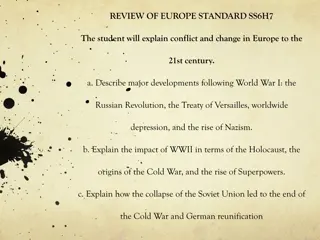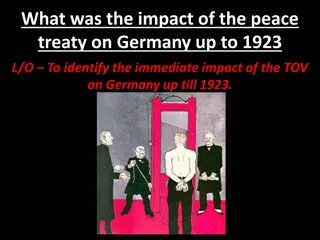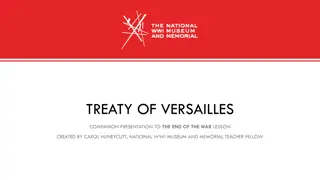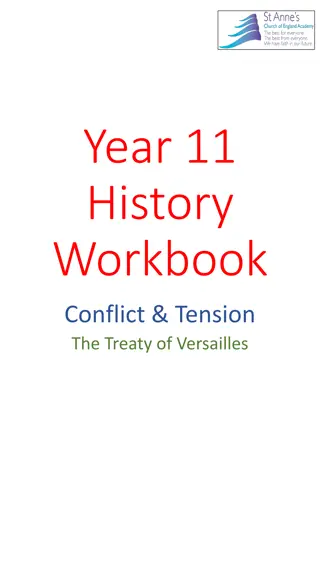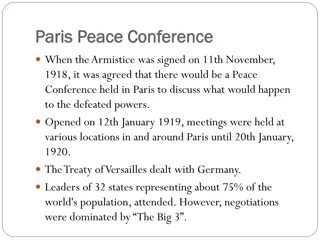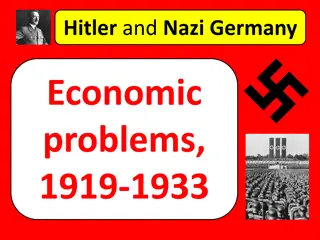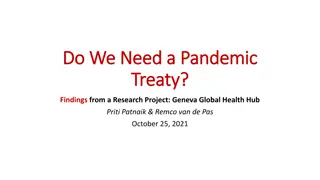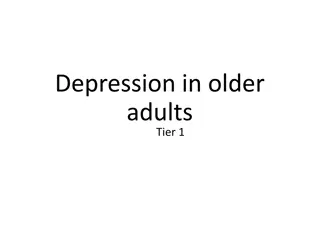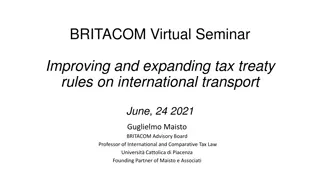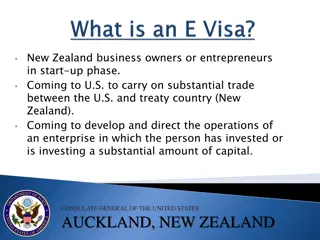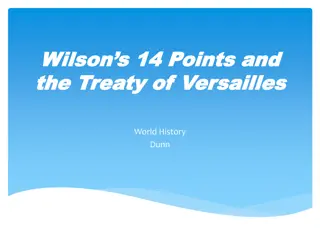
Impact of Treaty of Versailles on Weimar Republic: Economic Crisis & Rise of Hitler
Discover the repercussions of the Treaty of Versailles on the Weimar Republic, including economic depression, hyperinflation, and the rise of Hitler. Learn about Germany's obligations post-WWI, the heavy reparations imposed, and the limitations on armed forces that fueled resentment and political unrest.
Download Presentation

Please find below an Image/Link to download the presentation.
The content on the website is provided AS IS for your information and personal use only. It may not be sold, licensed, or shared on other websites without obtaining consent from the author. If you encounter any issues during the download, it is possible that the publisher has removed the file from their server.
You are allowed to download the files provided on this website for personal or commercial use, subject to the condition that they are used lawfully. All files are the property of their respective owners.
The content on the website is provided AS IS for your information and personal use only. It may not be sold, licensed, or shared on other websites without obtaining consent from the author.
E N D
Presentation Transcript
Warm-Up 11/30/2015 Weimar Republic (Page 99): the German government from 1919- 1922. Signed ToV. Blamed for Germany s depression & inflation problems. Economic Depression (Page 100): a sustained economic recession in which a nation's Gross National Product (GNP) is falling and marked by low production and sales and a high rate of business failures and unemployment Unemployment (Page 101): not able to collect a paycheck/ work for pay. Businesses closed. Leads to poverty & homelessness. Reparations (Page 97): $ payments made by a defeated country to another country for loss suffered during or as a result of war. Inflation (Page 102): a persistent, substantial rise in the general level of prices related to an increase in the volume of money and resulting in the loss of value of currency Hyperinflation (Page 103): extreme/ excessive inflation. Germany s situation in early 1920s under Weimar Republic. 1. 2. 3. 4. 5. 6.
The Treaty of Versailles (These notes need to be written in your notebook!!!) The Treaty of Versailles officially ended WWI It forced Germany to accept responsibility for causing the war It required Germany to pay reparations (payments) to other countries for their losses and damage It required Germany to give up 1 million square miles of land (size of Alaska and Texas combined) much of which was rich in natural resources (Know why this mattered!) It required Germany to limit its armed forces The U.S. did not sign the Treaty of Versailles
Treaty of Versailles (These notes need to be written in your notebook!!!) - The Treaty of Versailles was meant to humiliate Germany and its people. - It also made it impossible for the German people to try and rebuild their economy and their country. - In the end the Treaty of Versailles did little to help Europe. It angered the Germans and helped Hitler rise to power in a few years.
Germany is Guilty Armed forces are greatly limited Reparations must be paid German land & colonies given back LEague of Nations is Created to promote world peace negotiations
Listen to the National Public Radio story about Germany making its last reparation payment in September 2010. http://www.npr.org/templates/story/story.php? storyId=130232809
Media to help understand the ToV https://www.youtube.com/watch?v=o1IFePaNENQ Khan Academy explains the treaty (10 min) https://www.youtube.com/watch?v=5BbyZfSLRk0 Terms of ToV described
Discuss with a partner: How do you think the German people felt about the Treaty of Versailles? How do you think the War and the Treaty of Versailles affected Germany economically? How do you think the War and the Treaty of Versailles affected the rest of Europe?
The World After World War I
Media Footage Germany After WWI playlist *Pay close attention to the last 2! The Changed Face of Europe (Watch from home. 30 min but great explanation) Impact on Germany After WWI
After WWI and worldwide depression WWI affected the European economy because nations had war debt to repay Soldiers came home needing jobs, but there were not enough. Unemployment skyrocketed. (Listen to Stony Broke in No Man s Land ) In 1929, the stock market crash led to depression in the U.S. but also all over the world Countries experienced Inflation (a condition where prices rise and money loses value; therefore, you cannot buy as much as you used to with the same amount of money)

